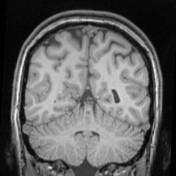Narrative, free will, and legal responsibility: reading Cathy Gere reading Michael Gazzaniga
By Kristopher A. Nelson
in
December 2011
1200 words / 6 min.
Tweet
Share
Michael Gazzaniga suggests that his finding that we construct post-hoc narratives potentially undermines the criminal requirement of mens rea (the “guilty mind” element of most crimes): if our actions are in many situations automatic, and our explanations of them-our decision-making moral sense, as it were-only post-hoc, then “‘My brain made me do it’ threatens to become a get-out-of-jail-free card available to everyone, not just to sufferers of fetal alcohol syndrome or schizophrenia.”

Please note that this post is from 2011. Evaluate with care and in light of later events.

In my 1996 paper, “But that Speaking Makes it So”: The Role of Narrative in the Formation of Community, I wrote:
The creation of a narrative–the telling of a story–is a means of smoothing out the rough edges of existence, a means of transforming raw experience into the webs of significance which constitute culture. Indeed, narrative is such a basic component of culture, of humanity, that we never actually have access to “raw experience.” Nothing exists for us “but that speaking makes it so,” and it is this speaking which provides the coherent meaning in our lives, rather than leaving them a series of discontinuous, unrelated events.
I was speaking from a literary-critical point of view, but Michael S. Gazzaniga’s brain research suggests that this is actually how the brain deals with the world:
Gazzaniga suggests that one of the modules in the human brain should go under the name of the “Interpreter.” This system–located in the left hemisphere, along with the speech center–is what concocts a coherent narrative out of all the brain’s activity, and the annals of neuroscience are now full of bizarre neurological conditions and deft experiments that reveal this constant creative act at work. Of great importance to Gazzaniga’s argument are some oft-cited experiments purportedly demonstrating that conscious awareness of making a decision registers only after the brain has primed itself for that course of action, and sometimes even after the action has been performed. Gazzaniga calls this living in “a post-hoc world.” … According to Gazzaniga, the stories the Interpreter tells tend to be bravely forward-looking, all about steering the ship of fate into uncertain waters, equipped with free will and unity of purpose; but these parables of moral courage are no more than specious retrospective rationalizations for things we do automatically.
via Cathy Gere’s review in Atmospheric Disturbances: On Michael Gazzaniga | The Nation.
 According to Gere, for Gazzaniga these “specious retrospective rationalizations” suggest a dis-unified consciousness that then calls into question the entire concept of free will: “If our brains act according to the causal laws governing all matter, in what sense can we be said to be free?” In legal terms, Gazzaniga suggests that this finding potentially undermines the criminal requirement of mens rea (the “guilty mind” element of most crimes): if our actions are in many situations automatic, and our explanations of them–our decision-making moral sense, as it were–only post-hoc, then “‘My brain made me do it’ threatens to become a get-out-of-jail-free card available to everyone, not just to sufferers of fetal alcohol syndrome or schizophrenia.”
According to Gere, for Gazzaniga these “specious retrospective rationalizations” suggest a dis-unified consciousness that then calls into question the entire concept of free will: “If our brains act according to the causal laws governing all matter, in what sense can we be said to be free?” In legal terms, Gazzaniga suggests that this finding potentially undermines the criminal requirement of mens rea (the “guilty mind” element of most crimes): if our actions are in many situations automatic, and our explanations of them–our decision-making moral sense, as it were–only post-hoc, then “‘My brain made me do it’ threatens to become a get-out-of-jail-free card available to everyone, not just to sufferers of fetal alcohol syndrome or schizophrenia.”
Gere contests this conclusion by arguing that there is a difference between automatic reflexes–“primed by millenniums of natural selection”–and rational, deliberate consideration done before an act. She discusses the legal concept of “diminished responsibility”: the idea that, for example, children have a less-developed sense of moral thinking, and thus should not be held as responsible for their actions as an adult. Insanity–a complex area of interaction between medicine and law–is another site where the law recognizes that some people–but certainly not all people–lack the ability to properly consider their actions. (Although neither seems to mention it, this is pretty much the difference between murder “with malice aforethought” and manslaughter in American common law.)
Gazzaniga gestures at one standard of legal insanity–the “policeman at the elbow” test–but Gere says all he does is “wag an admonishing finger” at the notion. Gere suggests that Gazzaniga’s absolute standard is that one either has reason or not, and that one is thus either responsible or not for one’s actions. She argues that reality–and the law–is more complex in its evaluations that this, and that Gazzaniga fails to acknowledge this complexity.
In criticizing Gazzaniga’s overly simplistic, and overly worried, notions about what his findings do for the idea of responsibility, Gere writes that “the concept [of responsibility] has been refined by witnesses, judges and juries ever since naturalistic accounts of mental illness began to gain traction, and it seems fairly robust as an intuition about justice.”
Although I would agree with Gere in many respects, I am not convinced that the (American, at least) legal system has really developed a “fairly robust” (in the sense of having a common, stable agreement on the matter) sense of how responsibility should function. There are numerous definitions of “insanity” in various states, and the standards have gone back and forth as first doctors suggest grounds for diminished responsibility, and then the public reacts against a sense that criminals are “getting off too easily” by virtue of an insanity defense, and push for tightening the rules.

Jared Lee Loughner, for example, the accused shooter of numerous people in Arizona (including U.S. Representative Gabrielle Gifford), was declared “unfit to stand trial” in federal court due to schizophrenia. Under federal law (revised due to popular anger after John Hinckley, the man who tried to assassinate President Ronald Reagan, was found not guilty by reason of insanity in 1982), this does not mean he is somehow not guilty. He can be forced to take medication until he is deemed “fit,” and can then be tried. Arizona state law is different: in Arizona, even if Loughner is found to have been completely insane at the time of the killings (and therefore “not responsible” in at least some sense), he would first be committed to a mental institution if convicted, then transferred to prison if he recovers his sanity. There is no such thing in Arizona as “not guilty by reason of insanity” anymore.
In the end, although I do not share Gazzaniga’s worry about the likelihood that his findings will result in reducing criminal liability, I am not convinced by Gere’s argument that the law has already established a more “robust” approach to the question. For me, the question of diminished responsibility, especially as a consequence of mental illness, is still a contested area of the law that is neither settled nor necessarily just.
But despite this quibble, I do agree with Gere that there is more risk that the legal rules that establish diminished responsibility are being eroded than is the fundamental concept of individual responsibility itself: “the concept of diminished responsibility is almost as much a pillar of the Anglo-American legal system as responsibility itself, and its actual erosion–as in the tabloid-stoked trend in Britain of trying minors as adults–is at least as troubling as its still-theoretical extension to all of us.”
For me, at least, just because we construct a post-hoc narrative about an action does not mean we cannot still be responsible for that action, nor do I think there’s a real risk that the legal system will disagree.
